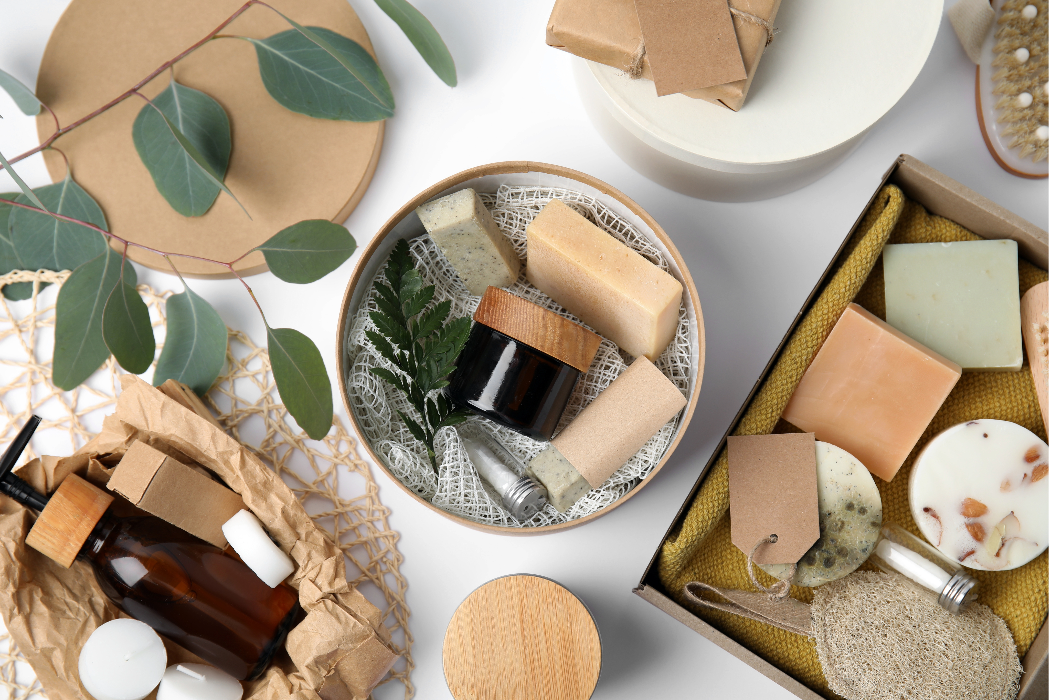With alarming headlines about toxic ingredients and recalls, the beauty and personal care industry has found itself at the forefront of consumer scrutiny (1). As individuals, we increasingly demand to know what’s behind the labels of the products we bring into our homes and apply to our bodies.
Amid this urgency, EWG Verified has become a well known indicator of clean standards and non-toxicity. But what does it really mean when a product is EWG Verified? And is it as trustworthy as the EWG says?
Keep reading to learn more about the EWG verification process, and how that should affect your beauty and personal care routine.
What Does EWG Verified Mean?
EWG Verified is a certification that indicates a beauty or personal care product has met stringent health standards. This includes full transparency about its ingredients list and eliminating many harmful ingredients from its production process.
To achieve this status, a product must go through a rigorous assessment process (2). This involves:
- Full Disclosure of Ingredients: Every single ingredient in the product must be publicly disclosed, leaving no room for hidden or ambiguous components.
- Adherence to Strict Standards: The product must steer clear of EWG’s “unacceptable” ingredients, which include those of concern for health, ecotoxicity, and contamination.
- Avoidance of Ingredients in EWG’s “Restricted” List: Even among acceptable ingredients, some have usage restrictions based on their potential health impact. EWG Verified products must comply with these restrictions.
- Good Manufacturing Practices: Beyond ingredients, the product’s manufacturing processes are also scrutinized to ensure they meet criteria for health and safety.
The EWG Verified program primarily focuses on products in the personal care and beauty industry. You can find EWG Verified items in these product categories:
- Skincare Products, including moisturizers, cleansers, toners, serums, and sunscreen
- Cosmetics, including foundation, lipsticks, eyeliners, and blushes
- Hair Care, including shampoos, conditioners, hair gels, and hair sprays
- Bath and Body, including body washes, lotions, and bath salts
- Baby Care, including diaper creams, baby lotions, shampoos, and wipes
- Oral Care, including toothpastes, mouthwashes, and other oral hygiene products
- Nail Products, including nail polishes, removers, and treatments
- Fragrances, including perfumes, colognes, and other scented products
- Men’s Grooming, including shaving creams, aftershaves, beard oils, and other male-specific products
- Deodorants, including both sprays and roll-ons
It’s worth noting that while the EWG Verified program started with a primary emphasis on personal care and beauty products, the Environmental Working Group (EWG) has, over the years, expanded its research and databases to include household cleaning products, food scores, and even water filters. However, the “EWG Verified” certification specifically caters to personal care and beauty products.
Does EWG Verified Mean Non-Toxic?
No, being EWG Verified does not guarantee a product is entirely non-toxic. However, since it doesn’t contain any ingredients from EWG’s list of concerning chemicals, it is less likely to result in harmful reactions.
Understanding "Non-Toxic"
In the context of personal care and beauty products, non-toxic typically implies that a product doesn’t contain ingredients that are known or suspected to cause harm to humans. However, the absence of harmful substances doesn’t always guarantee safety in every scenario, as individual reactions to ingredients can vary.
EWG's Standards
EWG maintains a list of ingredients that are considered of high concern, based on existing scientific literature and research. Their database, known as the Skin Deep Cosmetics Database, rates individual ingredients based on available evidence about their safety. When a product is EWG Verified, it means that its ingredients have been scrutinized against this database, ensuring that none of the listed concerning substances are present. While the certification is a strong indicator of a product’s safety, consumers should always review product labels and perform patch tests, especially if they have known sensitivities.
Is the EWG a Reliable Source?
Yes, many view the Environmental Working Group (EWG) as a reliable source when it comes to information on product safety. It’s garnered a large following of consumers who rely on its databases and resources to make informed choices. However, like any entity, it has faced criticisms and challenges.
Foundation & Principles
The EWG was founded in 1993 with the mission of empowering people to live healthier lives in a healthier environment. Through research and consumer education, the organization shines a spotlight on the potential risks associated with harmful ingredients in everyday products. Their dedication to transparency is evidenced by their comprehensive databases, such as the Skin Deep Cosmetics Database, which scores products based on their ingredient safety.
Common Criticisms
Critics of EWG often point to the organization’s stringent standards, arguing that they can sometimes label products as hazardous based on low-level ingredients that are deemed safe by other standards. Some in the scientific community believe that the EWG might overstate certain risks, causing undue alarm (3). However, EWG counters by emphasizing its precautionary approach, arguing that it is better to err on the side of caution, especially when long-term effects of many chemicals remain understudied.
Trustworthiness in the Broader Context
In the wider realm of clean beauty and personal care advocacy, EWG stands out as a pioneering entity. It has played a significant role in pushing for greater transparency and safety in the industry. While no organization is without fault or beyond critique, the lasting impact and dedication of EWG to its mission make it a valuable resource for many who are navigating the often confusing landscape of product ingredients and safety. It’s always recommended for consumers to cross-reference information and make informed decisions based on multiple sources.
Do Companies Pay to be EWG Verified?
Yes, companies are required to pay a fee to have their products reviewed and potentially achieve EWG Verified status (4). However, this fee doesn’t guarantee certification; it covers the administrative and operational costs of the review process. Just as with many other certification programs, a fee is a standard component, but the emphasis remains on meeting the stringent criteria set by EWG.
How Products are Evaluated
When a company submits a product for EWG verification, that product undergoes a comprehensive evaluation against the Environmental Working Group’s strict criteria for transparency, health, and safety. The assessment looks into every ingredient, checking for potential health hazards, environmental impact, and overall safety. Ingredients are compared against EWG’s extensive databases and the latest scientific research to determine their safety profile.
What the Fees Cover
The fees associated with the EWG Verified program are channeled towards supporting the research, database maintenance, and administrative work involved in the certification process. Given the depth and rigor of the assessment, these fees ensure that the organization has the necessary resources to maintain the standards it upholds. It’s worth noting that these fees are in line with the broader industry standards for similar certification processes, ensuring that the program remains sustainable and can continue to help consumers seeking safer product choices.
EWG Verified vs. EWG's Skin Deep Database
At first glance, the terms “EWG Verified” and “EWG’s Skin Deep Database” might seem interchangeable, but they actually represent two distinct components of EWG’s approach to product safety.
EWG Verified
This is a certification indicating that a product has undergone rigorous evaluation and meets EWG’s criteria for health and safety. EWG Verified products have successfully eliminated a list of ingredients that EWG finds concerning. In short, EWG Verified acts as a seal of approval, offering a quick and easily identifiable way for consumers to spot products that adhere to high standards of safety and transparency.
EWG's Skin Deep Database
While EWG Verified is a certification, the Skin Deep Database is an expansive tool that provides insights into thousands of products and individual ingredients. Products in the database are scored based on the safety of their ingredients. The highest rating for a product is EWG Verified, but the database also includes products that are ranked lower (1-10, with 10 being the worst) so you can make a nuanced decision.
Key Benefits of Buying EWG Verified Products
Choosing EWG Verified products provides transparency and lowers the risk of harm:
- Transparency and Rigorous Evaluation: Purchasing EWG Verified products means consumers are selecting items that have undergone a meticulous review process, ensuring that the ingredients used are fully disclosed and examined.
- Limiting Potential Harm: Since EWG Verified products are prohibited from including a number of harmful chemicals, buyers can be more confident that they’re avoiding many ingredients that might be detrimental to health. This reduces the guesswork and research in deciphering complex ingredient lists.
- Supporting Research and Advocacy: By choosing EWG Verified products, consumers indirectly support the Environmental Working Group’s broader mission of research, education, and advocacy for safer products and practices in various industries.
- Promoting Industry Change: Supporting products with such certifications indirectly pushes other brands to consider cleaner formulations and more transparent practices, fostering positive industry-wide change.
In the vast and evolving world of beauty and personal care, discerning what’s truly safe for our skin and health can be a challenge. EWG Verified can simplify our choices and foster a safer, more informed beauty and personal care landscape.
References
- “Many Personal Care Products Contain Harmful Chemicals. Here’s What to Do About It.” New York Times, 2023. https://www.nytimes.com/2023/02/15/well/live/personal-care-products-chemicals.html
- “For Companies: FAQ.” Environmental Working Group. https://www.ewg.org/ewgverified/faq.php
- “A Case Against the EWG.” The Eco Well, 2019. https://www.theecowell.com/blog/a-case-against-the-ewg
- “How We Work with Companies.” Environmental Working Group. https://www.ewg.org/ewgverified/how-we-work-with-companies.php




